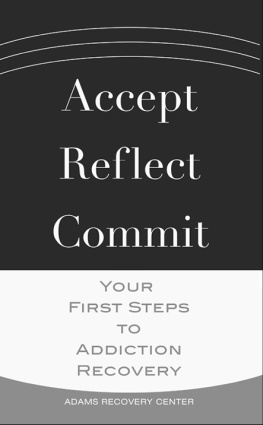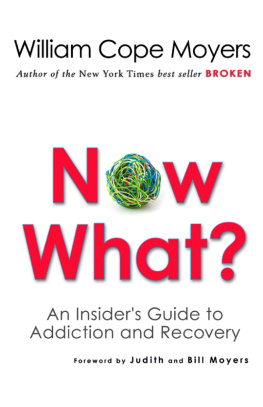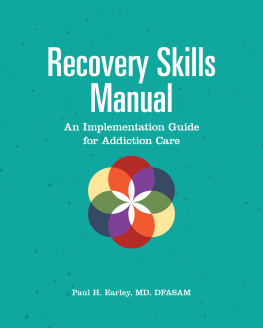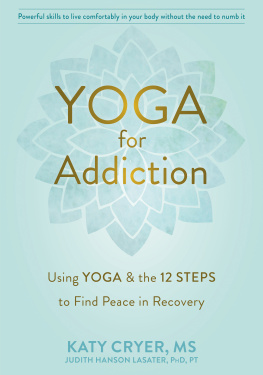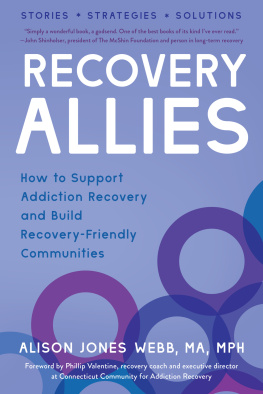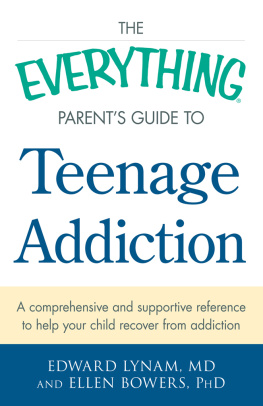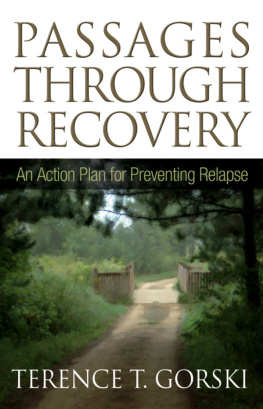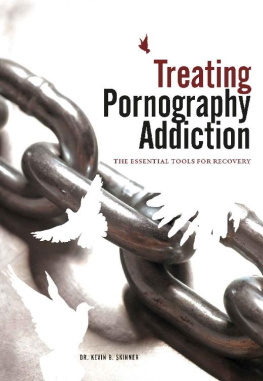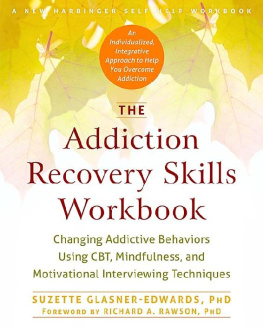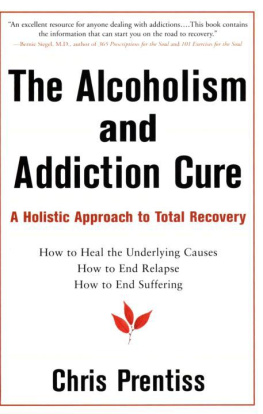accept | reflect | commit
Copyright 2017 by KiCam Projects
All rights reserved. No part of this publication may be reproduced, stored in a retrieval system, or transmitted, in any form or by any means, electronic, mechanical, photocopying, recording, or otherwise, without the prior written permission of the publisher.
This book is not intended as a substitute for the medical advice and care of physicians and mental health professionals. The reader should regularly consult a physician and/or mental health professional in all matters related to medical and mental health care, including, but not limited to, the treatment of addictions. The author and publisher hereby disclaim all liability to any party for any causes of action arising from reliance upon the advice presented in this book.
Cover and book design by Mark Sullivan
ISBN 978-0-9977222-9-1 (paperback)
ISBN 978-0-9985216-0-2 (e-book)
Printed in the United States of America
Published by KiCam Projects
www.KiCamProjects.com
contents
Introduction
ix
Chapter One: The Tipping Point
Chapter Two: Choosing the Right Treatment
Chapter Three: Trusting the Process
Chapter Four: Playing the Victim Role
Chapter Five: Wearing a Mask
Chapter Six: People-Pleasing
Chapter Seven: Avoiding Dangerous Comparisons
Chapter Eight: Managing Your Anger
Chapter Nine: Forgiving Yourself and Others
Chapter Ten: Dealing with Death
Chapter Eleven: The Issue with Cross-Addiction
Chapter Twelve: Frequently Asked Questions
Resources
Introduction
We are so excited you are holding this book right now. No, really. This is huge. Whether you are someone who has been struggling with addiction, you are the loved one of that person, or you just want to learn more about addiction and its treatment, this is a great step. We wrote this book for you, and you found it! Thats awesome. So, lets introduce some things first.
Why We Wrote This Book
The fact is, addiction is widely misunderstood. At Adams Recovery Center (ARC), we speak with many confused family members and friends of our clients who cannot understand why their loved one cannot simply stop using. They dont understand why their loved one has stolen, lied, manipulated, and wrecked his or her life over a drug. Its confusing and hurtful. They want answers, and they want to understand.
This is common for the general public as well. Whenever a news article detailing an overdose, an accident caused by a drunk driver, or a crime committed by people addicted to substances is released, there is quick judgment. Look at how many communities petition against rehabilitation centers, detox clinics, or sober-living houses. They want people to get help, but not anywhere close to them. Its a classic not in my backyard mentality. And we get it. Addiction is scary. Its easy to see those news articles and make assumptions. The reality is, though, addiction is everywhere. It is in your backyard, your schools, your churches, and your shopping centers.
The other reality is that people who are addicted to substances also experience confusion. They wonder how their lives became so unmanageable and why they cant simply stop using. They might have been to multiple treatment centers and still find themselves returning to their substance of choice. They hear stories of hope in the recovery community and wonder why they cant seem to get it right. Unfortunately, sometimes they dont have the opportunity. The Centers for Disease Control and Prevention states that in the United States ninety-one people die every day from opioid overdose, and excessive alcohol use accounts for one out of ten deaths among adults.
Its becoming clearer and clearer that addiction is a life-or-death issue, and those seeking treatment and relief from these substances are fighting a very serious battle. We know, we knowwe just got pretty intense! The reason for that, though, is because we are so passionate about helping people fight that battle. We have dedicated our lives to helping equip people with the tools necessary to live healthy, drug-free lives.
Within these pages, you will find information about the common thought processes and behaviors associated with addiction. If youre looking for highly technical and clinical information, this book might not be for you. We did not write this book for the clinician, but for the everyday person seeking to better understand addiction and its treatment processes. We wanted to make this information easily digestible and uncomplicated. We believe that, when it boils down to it, sobriety is simple. Its the problematic thoughts and behaviors that come with an addictive lifestyle that make it difficult.
We cover a wide variety of topics in this book, and they are all things we talk about daily with the clients at our treatment facilities. Weve even thrown in some information about common thinking errors and thought processes that can make it difficult to move forward in sobriety, such as black-and-white thinking, instant gratification, and the victim mentality. We wanted to hit all the major areas we address with our clients and their families.
We dont believe this information is sacred or that you need to attend our facility to learn these secrets. In fact, there arent any secrets at all! There is no secret to sobriety. Its all about a true willingness to change and to put forth the consistent effort needed to make those changes last.
Our Program
ARC is an agency dedicated to change. We are a separate-gender drug and alcohol treatment program located in Clermont County, Ohio. We offer residential, intensive outpatient, and individual counseling services. Our program is a modified Therapeutic Community running the Hazelden clinical curriculum, and we use the latest evidence-based practices and incorporate cognitive behavioral therapy, rational-emotive behavior therapy, and behavior therapy to maximize client gains in the program. Our inpatient program is designed for an approximate 180-day stay. Our staff includes drug and alcohol counselors and mental health counselors.
ARC embraced the Therapeutic Community model due to its renowned success worldwide. The Therapeutic Community is a model recognized and endorsed by the United States federal government. Within the T.C., clients (called sisters or brothers and as a collective referred to as the family) come out of their denial and into acceptance regarding their substance abuse. Clients expose their thinking errors and learn how to look at people, places, and things in a different fashion. The T.C. is a residential hierarchy in which every resident has a job (for example, cleaning the kitchen, taking out the trash, inspecting the dorms, etc.). Clients engage in five hours of group therapy per day, one hour of individual counseling per week, and case management as needed.
We do not believe that one size fits all when it comes to treatment, and we do not believe we can simply hand clients the answers. Instead, we help them find their own.
We do believe in the importance of sober support and family involvement, which is why we run a weekly family group and visit on Saturdays. Family members educating themselves on addiction and making their own changes are often an important component to our clients treatment. Thats why we promote this book for family members, too. Many of the concepts in this book are not addiction-specific, but human-specific. Unfortunately, as humans, we are not perfect. A lot of the information in this book can help each of us get that little bit closer, though.
When a client has made sufficient evident clinical and personal progress at ARC, the client graduates and is referred for aftercare. We make sure our graduates feel comfortable and confident in themselves and in their aftercare plans. Weve had many clients go on to live successful lives free of substances, and we love hearing from these clients and celebrating the continued progress theyve made.
Next page
